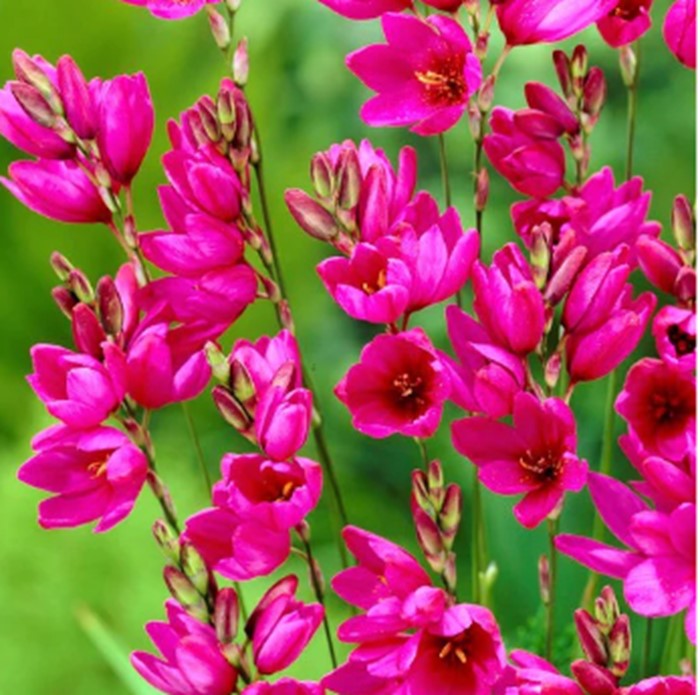African corn lilies, also known as Ixia, are stunning flowering plants that brighten up any garden with their colorful blooms. However, these delicate flowers can fall victim to scale infestations. Scales are tiny sap-sucking insects that attach themselves to plant stems and leaves, weakening the plant by extracting fluids and nutrients. If left unchecked, a major scale infestation can seriously damage or even kill an African corn lily.
In this comprehensive guide, we will explore the best methods for getting rid of scales on African corn lily flowers, drawing on the latest research and gardening expertise We will cover how to identify scale insects, effective treatment options using natural or chemical pesticides, and prevention tips to avoid future infestations.
Identifying Scales on African Corn Lilies
The first step is learning how to spot scales on your plants Here are some signs that your African corn lily has a scale problem
-
Tiny bumps on stems and undersides of leaves Scales often resemble small raised spots or unusual growths They may be brown, black, white or a mix of colors.
-
Excess honeydew on leaves and stems. Scales excrete sticky honeydew as they feed, which can promote mold growth.
-
Chlorosis, yellowing or spotting on leaves and flowers. This indicates the scales are draining nutrients.
-
Weakened or stunted plants. Heavy scale infestations deprive the plant of nourishment.
-
Ants crawling on the plant. Ants are often attracted to the honeydew secreted by scales.
Carefully inspecting plants regularly makes it easier to detect scales before they get out of control. Pay extra attention to the undersides of leaves and the joints of stems.
Effective Treatment Methods
Once you confirm the presence of scales, take prompt action to treat the infestation. Here are some effective remedies:
Natural Pesticide Options
-
Horticultural oils: These organic oils smother scales and eggs by blocking their respiration. Apply as directed during the dormant season.
-
Insecticidal soaps: Soaps dissolve the protective coating of scales. Spray directly on pests for best results.
-
Neem oil: Derived from the neem tree, this oil disrupts the scales’ growth cycle. Mix with water and spray on affected areas.
-
Rubbing alcohol: Wipe scales off individually with a cotton swab soaked in 70% isopropyl alcohol. This kills scale instantly on contact.
Chemical Pesticide Options
-
Systemic insecticides: Applied to soil, these are absorbed by plant roots providing protection from scales. Imidacloprid is one common chemical option.
-
Contact insecticides: Sprayed directly on pests, carbaryl, malathion and bifenthrin quickly kill adult scales.
-
Dormant oil sprays: Applied when plants are dormant, these oils coat surfaces suffocating overwintering scales.
For heavy infestations, a combination of pesticide sprays and manual removal may be required. Always follow label directions carefully when using chemical pesticides.
Preventing Future Scale Infestations
Stopping an initial attack is only half the battle. You’ll also need to take proactive steps to prevent scales from recurring:
-
Monitor plants vigilantly for early signs of scales. Catch infestations before they multiply.
-
Promote beneficial insects like ladybugs that prey on scales. Avoid pesticides that harm helpful predators.
-
Remove or prune away heavily infested plant parts. This limits the spread of scales.
-
Enhance air circulation and sunlight with proper spacing and pruning. This discourages scales.
-
Clean up fallen leaves, debris and weeds where scales may thrive. Keep the garden tidy.
-
Use row covers as a physical barrier against scales in vegetable gardens.
-
Apply dormant oil spray coating as a preventive scale deterrent.
-
Fertilize conservatively. Excess nitrogen can make plants more susceptible to pests.
Left uncontrolled, scales can seriously damage or kill African corn lilies and other garden plants. But armed with the knowledge of how to recognize these pests, treat infestations effectively, and prevent future attacks, you can protect your plants. Be vigilant about monitoring for scales, and take swift action at the first sign of an infestation. With persistence and dedication to proper care, your African corn lilies will once again be vibrant and scale-free, delighting you with their colorful blooms.

k
The COMPLETE Guide to Getting Rid of Scale Insects
FAQ
How do you permanently get rid of scale on plants?
How do you get rid of the scale on Dracaena?
Does vinegar get rid of scale on plants?
How to propagate African corn lily?
The propagation of this plant is also done through seeds; however, it might take three years or more for them to bloom. The Ixia flower seeds should be covered with soil once the last spring frost has passed. The African corn lily also propagates naturally through insects and bees.
Are African corn lilies perennials?
A South African native, Ixia plant info indicates African corn lily plants are short-lived perennials and may perform as annuals, not returning after a hard winter. However, Ixia wand flower corms are readily available in garden centers and big box stores and are usually not expensive, so replanting is not much of a chore.
What does a corn lily look like?
This showy “Corn Lily” is actually in the Iris family and native to South Africa’s Cape Province. The yellow and orange-yellow flowers are star-shaped of 6 petals up to 2.5 inches. Leaves are long and sword-like while10-20 inch wiry stems hold the clusters of flowers.
Are African corn lilies deer resistant?
Be sure to water well, but avoid overwatering as this will damage the plant. The African corn lily is deer resistant and is known to attract bees and other insects which help in achieving eco-balance and restoring a level of biodiversity. This plant looks great as a house plant, in containers, and also as borders.
